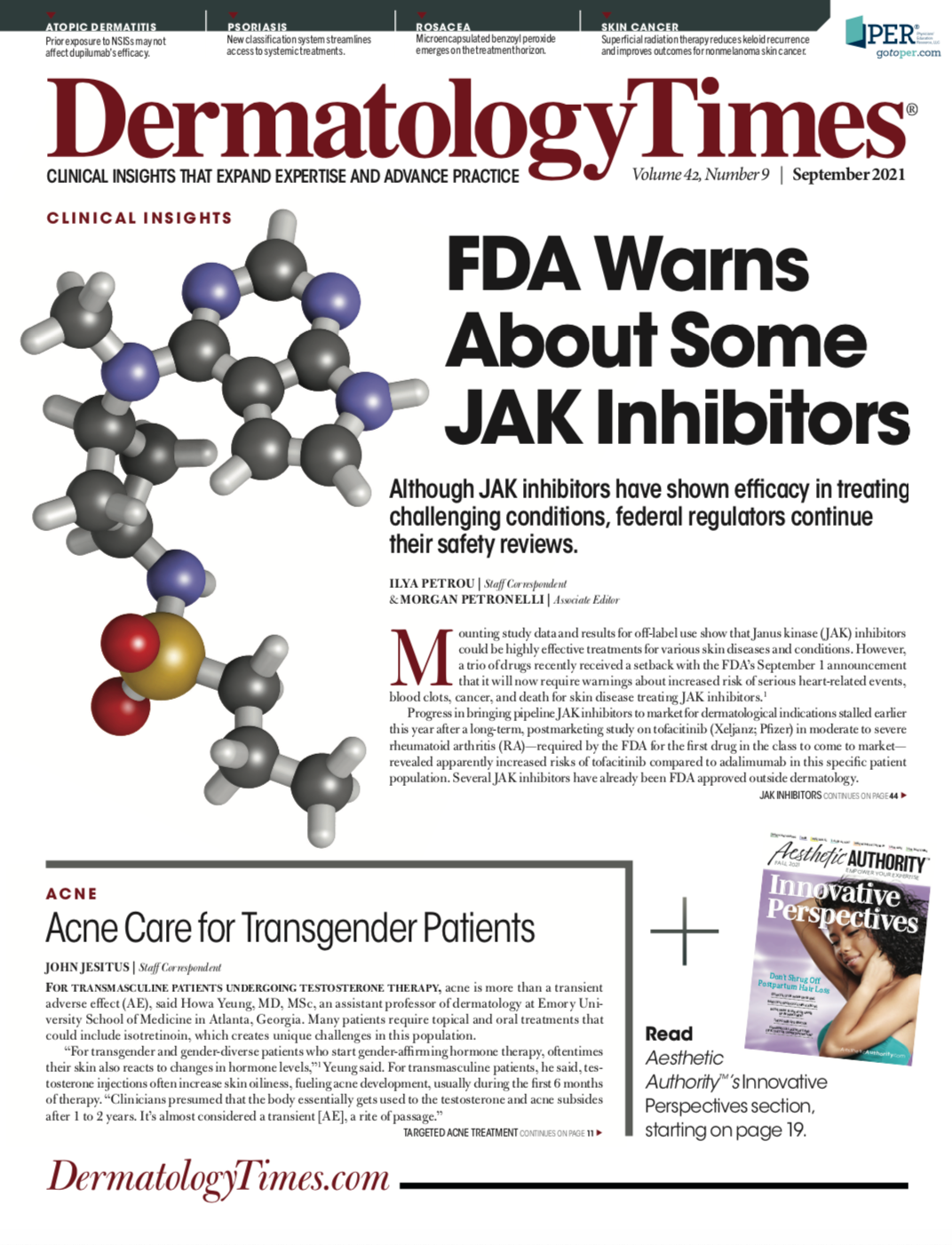- Acne
- Actinic Keratosis
- Aesthetics
- Alopecia
- Atopic Dermatitis
- Buy-and-Bill
- COVID-19
- Case-Based Roundtable
- Chronic Hand Eczema
- Drug Watch
- Eczema
- General Dermatology
- Hidradenitis Suppurativa
- Melasma
- NP and PA
- Pediatric Dermatology
- Pigmentary Disorders
- Practice Management
- Precision Medicine and Biologics
- Prurigo Nodularis
- Psoriasis
- Psoriatic Arthritis
- Rare Disease
- Rosacea
- Skin Cancer
- Vitiligo
- Wound Care
Publication
Article
Dermatology Times
Non-Steroidal Immunosuppressants for AD May Not Impact Dupilumab Treatment
Author(s):
Patients on placebo with a history of systemic non-steroidal immunosuppressants generally fared worse than their treatment-naïve counterparts.
Findings from an analysis of 4 phase 3 trials on dupilumab (Dupixent; Sanofi and Regeneron) for atopic dermatitis indicated that biologic efficacy is comparable between patients who have and have not had prior exposure to systemic non-steroidal immunosuppressants. (NSISS)
The post-hoc analysis was led by Christopher Griffiths, MD, of the University of Manchester, and pooled data from the LIBERTY AD SOLO 1, LIBERTY AD SOLO 2, LIBERTY AD CAFÉ, AND LIBERTY AD CHRONOS trials. The investigators sought to determine any impact of NSISS use on dupilumab treatment.
“Substantial evidence from large, randomized, double-blind, placebo-controlled clinical trials supports the use of dupilumab to treat adults with moderate-to-severe AD, with a favorable long-term safety profile,” Griffiths and team noted. However, many patients with moderate-to-severe atopic dermatitis are treated with NSISS, despite their controversial risk-benefit profile.
Findings from the Post-Hoc Analysis
The investigators evaluated a total of 1553 patients who had been randomized to either dupilumab 300 mg as monotherapy or placebo. Patients who received concomitant topical steroids were also included in the analysis.
“Baseline data for patient demographics, characteristics, and prior use of NSISS from all four clinical trials were very similar, and thus pooled,” the team explained. “Patients have been stratified by at least one prior or no prior use of systemic NSISS.”
Roughly 10-11% of patients who had previously been treated with NSISS received 2 NSISS, they noted.
Overall, they found that patients stratified to the NSISS cohort (dupilumab, n = 226; control, n = 277) had numerically higher disease severity at baseline, save for itch.
However, all those who were treated with dupilumab, regardless of concomitant topical steroid or NSISS use, achieved a significantly higher percentage reduction in Eczema Area and Severity Index (EASI) scores from baseline when compared with the placebo groups at week 4.
As such, in that same time span, a higher proportion of patients on the biologic achieved EASI score ≤7.
In the dupilumab cohorts, improvements were observed in relation to SCORing Atopic Dermatitis (SCORAD), Dermatology Life Quality Index (DLQI), and Patient Oriented Eczema Measure (POEM) scores by week 2.
Similarly, more patients on dupilumab achieved Peak Pruritus Numerical Rating Scale ≤4, POEM ≤7, and DLQI ≤5 by week 4.
“By week 16 of dupilumab with concomitant topical corticosteroid treatment (pooled analysis of CAFE and CHRONOS trials), patients in both [NSIsS and non-NSISS] populations achieved significant (P<0.001) improvements in EASI, SCORAD, DLQI, POEM, and Peak Pruritus NRS,” Griffith’s team reported. Improvements were largely maintained through week 52 of treatment.
Similar improvements were observed for the pooled LIBERTY AD SOLO 1 and LIBERTY AD SOLO 2 trials after 16 weeks of treatment.
Among those in the placebo groups, patients who had been on systemic NSISS at least 1 year prior showed achieved consistently lower improvements in EASI, SCORAD and Peak Pruritus NRS) when compared with treatment-naive patients.
However, this was not observed for patients on dupilumab.
Even more, >60% of dupilumab patients who received concomitant topical corticosteroids, regardless of NSISS history, rated overall-well being in skin condition as “good,” “very,” and “excellent.”
Numerically fewer patients on placebo with a history of NSISS use provided similar response versus NSISS-naïve placebo patients.
“Taken together, these results indicate that a patient’s prior history of use of systemic NSISS does not impact the efficacy of dupilumab treatment for moderate-to-severe AD, supporting its use both as a systemic first-line treatment and in patients in whom systemic NSISS have been used,” the investigators wrote.
“Dupilumab brings a new perspective to systemic treatment of this patient population, offering the prospect of long-term control and flare prevention,” they concluded.
The study, “Dupilumab in Adults with Moderate-to-Severe Atopic Dermatitis and Prior Use of Systemic Non-Steroidal Immunosuppressants: Analysis of Four Phase 3 Trials,” was published online in Dermatology and Therapy.
This article was originally published by our sister publication HCP Live.

Newsletter
Like what you’re reading? Subscribe to Dermatology Times for weekly updates on therapies, innovations, and real-world practice tips.



















